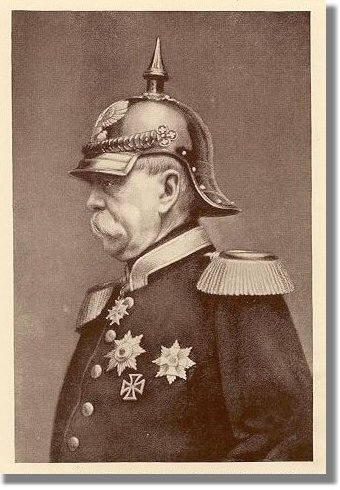May 29, 2008
Why two world wars were fought
Pat Buchanan knows his history, whatever else you might think of him, and he has just written a good summary of the revisionist arguments about the two world wars. I myself alluded briefly to such arguments on 23rd.
I am one of the many history buffs who agree that WWI was the big mistake so I agree with Buchanan there and I certainly agree with him that the peace-obsessed politics of the interwar period were the breeding ground for WWII.
Buchanan is however being wise in hindsight, something easy to do. What he seems largely unaware of is the psychology behind those two disastrous wars. WWI was NOT fought over the assassination of an Austrian archduke in Serbia. Politicians can be pretty foolish but we do our ancestors discredit to think that they were as foolish as that.
Strangely, WWI was the fruit of the long peace engineered by the "Iron Chancellor" of Prussia, Prince Otto von Bismarck.

Bismarck gained great authority from the way he used both war and politics to extend the Prussian domain to the point that almost the whole of the German-speaking lands came under the sway of the Prussian crown in the form of a united Germany -- with the Prussian defeat of Napoleon III at Sedan being the clincher.
So how did Bismarck use that great authority and the pre-eminent German military machine that he controlled? If he had been a Leftist like Napoleon, he would have attempted to conquer the world. But he was a conservative so he did no such thing. Once he had attained his aim of a united Heimatland (homeland) -- i.e. a united Germany --- he used his great talents and resources to ensure that there were no more wars in Europe.
And the long peace from 1872 onwards allowed Europeans to concentrate on constructive pursuits for change -- leading to vast economic growth in most of Europe (including Russia). But the huge leap forward in science, technology and prosperity in the late 19th century led to hubris among the populations concened. They were so impressed by their own achievements that they thought they could conquer the world -- literally. And they actually did to some extent -- bringing large slices of what we would now call the Third World under their rule.
Sadly, however, communications then fell a long way short of the global village that we inhabit today and most people in the national populations concerned concluded that their great achievements were the fruit of a national genius peculiar to them. That other nations were doing about equally as well was lost sight of. It was, in short, a time of overweening national pride and they all thought that they could conquer anyone. So they were all spoiling for a fight. They thought that if they could have a war, they could conquer the other nations around them in six weeks. So after Bismarck was no longer there to restrain them, a pretext for a fight was found and the nations of Europe all marched into WWI in full confidence of a rapid national triumph. It was however reality that triumphed.
And after the colossal horror of WWI, who can blame the politicians of the interwar years for doing everything they could to run away from another war? That running away does more harm than good is however the lesson we must learn from that.
Buchanan's article stops before the events of WWII so I will stop there too. Much to be said there but some other time. I do think Churchill was right in his unswerving enmity to Nazism, however.
Go to John Ray's Main academic menu
Go to Menu of longer writings
Go to John Ray's basic home page
Go to John Ray's pictorial Home Page
Go to Selected pictures from John Ray's blogs